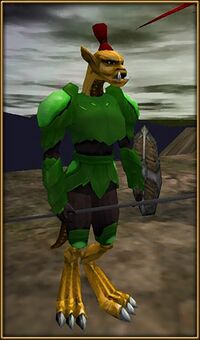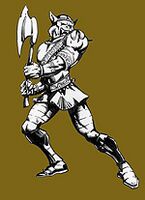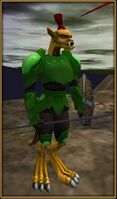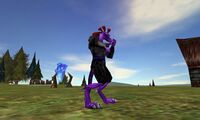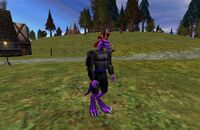| |
Related topics: Cultures, Tumerok, Category:Tumerok
The Tumerok are a race of warlike humanoid lizard folk, related to Drudges, Banderlings and Mosswarts. Though they aren't the largest of their kin, standing six feet tall on average, they are by far the most dangerous, as they are the only ones to have developed near human intelligence. [1] They fight with weapons, including bows and crossbows, and many can use sorcery. Their priestly caste is particulary adept at weilding magic. Their overlords are a match for the greatest human warriors. [1]
Though they were largely known as war-like raiders, sacking human towns across the land, this is not the true nature of the Tumerok. [2] In truth the Tumerok are good-natured[3] and once enjoyed a peaceful and artistic existence, and the Aun Tumerok have aspired to return to those ways. The Aun Tumerok who have joined with the Isparians have forsaken the Hea Tumerok and the Virindi influence that has set the Hea against the Isparians. Although the name Tumerok is actually a name outsiders have given to the Tumerok, the Aun Tumerok have learned to accept that name. [2]
History
On Ezheret
The Tumeroks call their home world Ezheret-Hazahtu, although they only live on the body they call Ezheret. This requires some explanation. While a sun does rise and fall in the sky, Ezheret actually orbits another, larger planet called Hazahtu. Hazahtu, or “The Blind Eye,” is an enormous, cloud-shrouded grey-blue orb. Legend holds that when the eye of Hazahtu loses its occlusion, the Tumeroks will be judged for their stewardship of the world.[4]
Ezheret is hot, humid, and prone to extended periods of foul weather. Gales and hurricanes are frequent, perhaps due to the unusual sparseness of dry land. The Tumerok tribes are spread across myriad archipelagos, separated by hours or days of journey by boat. [4]
The Tumeroks share Ezheret with the scavenger Drudges, as well as the perpetually warring Banderlings and Mosswarts.[4] [3] During Asheron's visit to the Moon of Ezheret, he mentions that the Tonk appeared to have seen Empyreans before, several of their structures appeared to be influenced by the architecture once prominent on Ireth Lassel, though certainly more crude and rudimentary. The basis for their art and their understanding of magic as a tribal gift from the gods that sang throughout the cosmos, as they referred to the suns, was also reminiscent of the Empyreans first steps into grasping magical talents. [3]
On Dereth
Tribal warmongers by nature, Tumeroks were rejected as slaves by the Olthoi for being too brutish. [1]
The face of the Tumeroks known to humanity was that of warlike humanoids. In the early years after the retreat of the Olthoi, Tumerok raider bands were a constant threat to human settlements, sacking towns from Holtburg to Yanshi. Humanity rarely came out the better in these engagements; at one point the entire adult population of Holtburg was slaughtered or taken as slaves.[4]
This was not the true nature of the Tumerok. They once enjoyed a peaceful, communal culture, rich in oral tradition, and a unique magic system based on ritual drumming.[4]
But as humans always arrive on this world at one of the nine portal-nexus towns of Osteth, so do the Tumeroks always arrive on the Marescent Plateau of Marae Lassel. This trapped them on a much smaller landmass. They found themselves in a life-or death struggle with the brood of a second Olthoi Queen – not the one slain by Thorsten Cragstone and Elysa Strathelar. The Tumeroks found a way to pen in the Olthoi (which they call “Wharu”) that was as idiosyncratic as their culture.[4] [5]
Tumeroks and Virindi
Perhaps they could have lived in peace, if the Virindi, known as the "the atual arutoa"[6] to the Tumeroks, had not discovered them.[4]
At some point prior to 0 PY,[4] [7] the Virindi discovered the Tumeroks trapped on Marae Lassel.[4] The cloaked creatures struck a deadly bargain with Aranpuh, an embittered young outcast.[6] Aranpuh was taken and altered – perhaps the same alteration chronicled by the Aluvian Candeth Martine and possibly by Aerbax itself [8]) to look more human. So empowered, Aranpuh returned with a host of other angry young Tumeroks, and seized control of the Hea tribe.[4]
After Aran successfully took control of the Hea tribe of Tumeroks and gained the name Hea Arantah [6], all of his new tribesmen were altered in the same way. At some point after the alteration of the Hea, but before the Hea invaded the mainland (though after 0 PY[9][10]) Lilitha was captured by Hea Temenua on Marae Lassel.[11] She was given to the Virindi, who told the Hea, "Here are the ones we have gifted you in the image of. Behold! We will open Wind and Light to you, that you may go among their holdings. Bring them to us. We wish to understand them, and the one they are protected by."[11]
In return for doing the bidding of the Virindi, the Hea are granted Virindi weapons and passage to the freedom of mainland Dereth. But there was one last condition of this bargain. In order to serve as “infiltrators,” the Virindi altered the bodies of the Hea from their natural form to something more….human.[4] [5] It is “Hea Arantah's” warriors who have bedeviled humans for so long. [4] In the early years after the defeat of the The One Queen[4][7] (the exact date is unknown, some time between 0 PY[4][7] and 7 PY [12]) Tumeroks first began to attack human settlements. The loose siege maintained around Dryreach, for example, is used by the tribe as a brutal training ground for new Tumerok warriors. [4] [5] It wasn't until Leafcull, 12 PY when Marae Lassel was opened that humans discovered the true nature of the relationship between Tumeroks and Virindi.[4]
Culture
In truth, the word “tumerok” is not their name for themselves. Tumeroks refer to themselves as Tonk, a sound that has spiritual significance to them. It seems to imply the concept of “prime mover.” It is not yet known what “tumerok” actually means, although the revulsion with which they react to it suggests it is an insult.[4]
The Tumeroks transplanted to Dereth prefer to dwell in dry, rocky regions, and have made the Direlands their home. The Hea Tumerok have dug their own redoubts, and built several fortresses. Perhaps due to the influence of the Virindi, they have taken to using other humanoids as slaves and foot soldiers. They sometimes encroach on human settlements, engaging in both quick raids and longer sieges, using numbers to ensure victory.[4] [1]
Tumerok names are composed of three parts in a specific order: xuta (tribe) name, given name, and title/role within the xuta, according to the following set of roles:[4]
Tah' chieftain
Nua veteran warrior
Awa warrior
'Itea archer
Ona scout
Aua elder shaman (literally spirit [au] companion [ua])
Auri shaman (literally spirit [au] summoner [ri])
Rea hunter
Khe drum-speaker
Ura merchant
Puh outcast or rebel (literally “closed-mouth”)
So, for example, if Manu is a warrior (Awa) of the Hea xuta, he is called Hea Manuawa.
Tumerok Female names are often short Tumerok words or abbreviations that associate the female with some important deed or occasion. As such, most Tumeroks gain a new name when they reach adulthood. Female Tumeroks tend to favor short names. Tumeroks tend to use a tribal prefix only in formal occasions. Examples: Noua, Aeu, Kuri, Faun. [13]
Tumerok Male names are often Tumerok words that associate the male with some important deed or occasion. As such, most Tumeroks gain a new name when they reach adulthood. Tumeroks tend to use a tribal prefix only in formal occasions. Examples: Faranua, Amanua, Mireona, Taguauri. [13]
Rulers
Religions and Beliefs
Customs and Traditions
The Tumerok tribes on Ezheret are spread across myriad archipelagos, separated by hours or days of journey by boat. This could explain why drumming is so predominant in their culture; since it is difficult to stay in direct daily contact, friends and relations will stand on shores across from each other and pound their drums to communicate across the water. This “drum talking” is also used to stay in contact while riding out inclement weather.[4]
Ranks
| Rank | Male Title | Female Title |
|---|---|---|
| 10 | Tah | Tah |
| 9 | Sutah | Sutah |
| 8 | Kauh | Kauh |
| 7 | Nurea | Nurea |
| 6 | Rea | Rea |
| 5 | Turea | Turea |
| 4 | Nuona | Nuona |
| 3 | Ona | On a |
| 2 | Tuona | Tuona |
| 1 | Xutua | Xutua |
Real World Basis
Texts
![]() Letter From Home (Aun Tumerok)
Letter From Home (Aun Tumerok)
Internet Articles
Factions
Items
![]() Ornate Tumerok BreastplateFile:Siraluun Dress Icon.png Siraluun Dress
Ornate Tumerok BreastplateFile:Siraluun Dress Icon.png Siraluun Dress![]() Siraluun Headdress
Siraluun Headdress
![]() Aun Tanua's War Taiaha
Aun Tanua's War Taiaha![]() Awakener
Awakener![]() Barbed Crop
Barbed Crop![]() Ebon Spine Harpoon
Ebon Spine Harpoon![]() Hoeroa of Palenqual
Hoeroa of Palenqual![]() Kalindan of Palenqual
Kalindan of Palenqual![]() Invoker
Invoker![]() Overlord's Sword
Overlord's Sword![]() Siraluun Matihao
Siraluun Matihao![]() Stave of Palenqual
Stave of Palenqual![]() Atlatl (Palenqual's Living Weapons)
Atlatl (Palenqual's Living Weapons)![]() Buadren (Palenqual's Living Weapons)
Buadren (Palenqual's Living Weapons)![]() Hoeroa
Hoeroa![]() Kalindan
Kalindan![]() Korua
Korua![]() Okane
Okane![]() Panaq (Palenqual's Living Weapons)
Panaq (Palenqual's Living Weapons)![]() Taiaha
Taiaha![]() Tewhate
Tewhate![]() Ukira
Ukira![]() Waaika
Waaika![]() Tumerok Spear
Tumerok Spear![]() Vanguard Leader's Morningstar
Vanguard Leader's Morningstar![]() Vanguard Leader's Crossbow
Vanguard Leader's Crossbow![]() Virindi Implant (Purple)
Virindi Implant (Purple)![]() Virindi Implant (Red)
Virindi Implant (Red)
![]() Aun Papileona's Amulet
Aun Papileona's Amulet![]() Aun Pendant
Aun Pendant![]() Clay Figurine
Clay Figurine![]() Dried Meat
Dried Meat![]() Manuaka's Collar
Manuaka's Collar![]() Reshalra's Collar
Reshalra's Collar![]() Sahkurea's Collar
Sahkurea's Collar![]() Utelari's Collar
Utelari's Collar![]() Carenzi Totem
Carenzi Totem![]() Siraluun Totem
Siraluun Totem![]() Storm Totem
Storm Totem![]() Tonk Totem
Tonk Totem![]() Timaru Totem
Timaru Totem![]() Hea Totem
Hea Totem![]() Embroidered Bag
Embroidered Bag![]() Gold Tumerok Insignia
Gold Tumerok Insignia![]() Northern Tumerok Insignia
Northern Tumerok Insignia![]() Southern Tumerok Insignia
Southern Tumerok Insignia![]() Mark of the Overlord
Mark of the Overlord![]() Nutrient Oil Soaked Totem
Nutrient Oil Soaked Totem![]() Ritual Spear
Ritual Spear![]() Totem of Audetaunga
Totem of Audetaunga![]() Totem of Tanae
Totem of Tanae![]() Totem of Volkama
Totem of Volkama![]() Waaika Talisman
Waaika Talisman![]() Tewhate Talisman
Tewhate Talisman![]() Taiaha Talisman
Taiaha Talisman![]() Okane Talisman
Okane Talisman![]() Hoeroa Talisman
Hoeroa Talisman![]() Raeta's Necklace
Raeta's Necklace![]() Tumerok Salted Meat
Tumerok Salted Meat![]() Vanguard Leader's Amulet
Vanguard Leader's Amulet![]() Wooden Tumerok Figurine
Wooden Tumerok Figurine
Quests
- Aun Tanua's War Taiaha Quest
- Dansha-Ki's Rescue
- Hea Totem Quest
- Tumerok Gladiator Kill Task
- Ornate Tumerok Breastplate and Horned Lugian Helm
- Overlord's Sword Quest
- Palenqual's Living Weapons
- Renegade Bone Charm Quest
- Renegade Living Weapons
- Tumerok Banners Quest
- Tumerok Vanguard Outposts
Art & Images
Click image for full size version.
References
- ↑ 1.0 1.1 1.2 1.3 1999/11 Release - Asheron's Call Manual p. 64 - Tumerok
- ↑ 2.0 2.1 2011/10 Cloak of Darkness - Character Creation - Racial Lore: Aun Tumerok
- ↑ 3.0 3.1 3.2 2003/05 Discoveries - Theories of Ezheret
- ↑ 4.00 4.01 4.02 4.03 4.04 4.05 4.06 4.07 4.08 4.09 4.10 4.11 4.12 4.13 4.14 4.15 4.16 4.17 4.18 4.19 2001/11 Dark Majesty - Bestiary: Tumeroks
- ↑ 5.0 5.1 5.2 2010-/06 Shifting Gears - Tumerok (Town Network Painting)
- ↑ 6.0 6.1 6.2 2001/10 Dark Majesty - The Tah of Ahurenga
- ↑ 7.0 7.1 7.2 1999/11 Release - History of Fort Witshire
- ↑ 2003/01 The Slumbering Giant - Destructions and Beginnings
- ↑ 2001/11 Dark Majesty - Lilitha's Bow
- ↑ 2001/11 Dark Majesty - The Legend of Lilitha
- ↑ 11.0 11.1 2001/11 Dark Majesty - The One Named Lilitha
- ↑ 1999/11 Release - Asheron's Call Manual p. 25 - Rithwic
- ↑ 13.0 13.1 2011/10 Cloak of Darkness - Character Creation - Naming: Aun Tumerok
